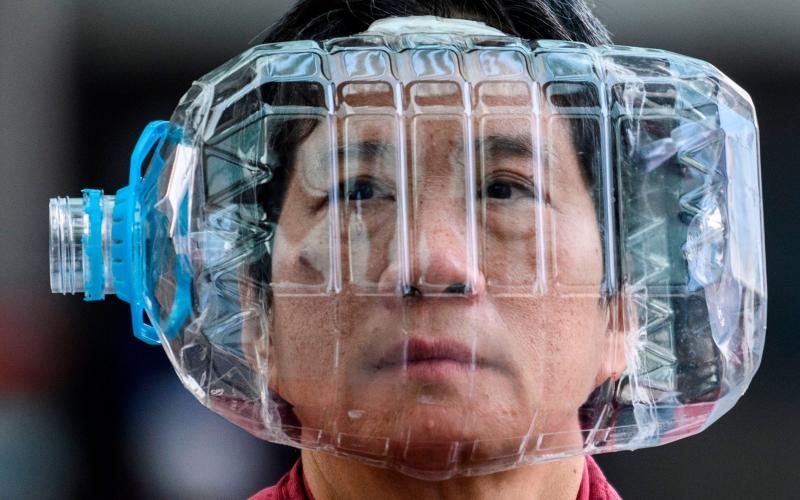Coronavirus myths: fact-checking the bogus health advice plaguing the internet
Primary tabs

Coronavirus myths: fact-checking the bogus health advice plaguing the internet
As fears about China’s new coronavirus (2019-nCoV) outbreak grow, so too do the number of myths about the virus – many of them more dangerous than the disease itself. The World Health Organization (WHO) is working with Google to combat false claims about the coronavirus, and Facebook, Twitter and YouTube are scrambling to shut down accounts responsible for spreading fake news. Dr Sylvie Briand, WHO's director of global infectious hazard preparedness, told a press conference there was an "infodemic" of false information spreading throughout the world. "We have realised over time that this infodemic could be really an obstacle for good response and hamper effective implementation of counter-measures,” she said. But even as experts ramp up efforts to stem the flow of spurious health advice, much nonsense is still slipping through the cracks. From home-cooked cures to makeshift masks, here are some of the most pernicious myths to look out for. If you see them circulating on social media report them to the platform provider. And if you think you may have symptoms of the coronavirus contact the NHS on 111. You should be wary of receiving packages from China FALSE. Despite what internet conspiracy theorists (or that Simpsons episode) might suggest, it is safe to receive post from China. The WHO has made it clear that previous analysis shows that coronaviruses do not survive long on surfaces, such as letters or packages, so those receiving mail from China are not at risk of contracting the new coronavirus. The cure to the coronavirus is in your kitchen FALSE. There is no specific cure for coronavirus and products like sesame seed oil, whiskey, garlic, kimchi and chicken soup are not going to help. Zhang Jinnong of Wuhan Union Hospital has been promoting the supposedly restorative powers of chicken soup. In an interview with the Changjiang Daily and Wuhan Evening Daily, Jinnong claimed to have nursed himself back to health with soup after contracting coronavirus in January. However, there is no evidence to suggest that this would have been a cure. Saline rinse and mouthwash can help prevent infection FALSE. The bathroom cupboard is not going to provide any more help in fighting coronavirus than the kitchen cupboard (unless it is to retrieve soap or hand sanitiser). Unfortunately, there is no evidence to suggest that regularly rinsing the nose with saline or gargling mouthwash will ward off the 2019-nCoV infection. However, hand hygiene is the first and most important line of defence. People can catch the disease when they put their hands infected with the virus to their mouth, nose or eyes. The single most important thing you can do to protect yourself is to keep your hands clean by washing them frequently with soap and water or, if you don't have access to running water, a hand sanitising gel. Drinking ‘Miracle Mineral Solution’ can kill the virus FALSE. Followers of the pro-Trump QAnon conspiracy theory have reportedly been encouraging others to combat the coronavirus by drinking a substance dubbed “Miracle Mineral Solution”. The liquid contains bleach and has also been falsely promoted as a miracle cure for everything from autism to cancer and HIV. Experts, including the US Food and Drug Administration, have repeatedly warned consumers not to fall for the scam as it could cause severe vomiting and liver failure. Covering your face with homemade barriers is a good idea FALSE. Images of people wearing everything from face masks made from fruit to full-face helmets forged from recycled water bottles have gone viral on social media. Elsewhere sales of paper masks have gone through the roof. The South Korean government has even threatened citizens with two years in prison if they are found to be hoarding face masks and other products that may help slow the spread. Do any of these preventative methods actually work? No. Water bottles and plastic bags worn over the head pose a potential suffocation risk. Even surgical masks are unlikely to help. They are designed to keep droplets in, not out. Pets can spread the coronavirus at home FALSE. Again, the WHO quickly dispelled this myth after disturbing images emerged reportedly showing dead pets thrown to their deaths from tower blocks to stop them spreading the virus. “At present,” states the WHO website, “there is no evidence that companion animals/pets such as dogs or cats can be infected with the new coronavirus.” That means you can continue to give your family pet all the love you like. However, it is a good idea to properly wash your hands with soap and water afterwards as pets can harbour other bugs. Antibiotics can fight off the virus FALSE. Antibiotics fight bacteria not viruses. Antibiotics may be used to fight secondary infections in patients with coronavirus but they do not protect against the disease itself. Scientists are trying to develop antivirals and are repurposing existing drugs but there is currently no specific treatment for the new coronavirus. Protect yourself and your family by learning more about Global Health Security. And sign up to our weekly newsletter here.
- Log in to post comments
- 482 reads